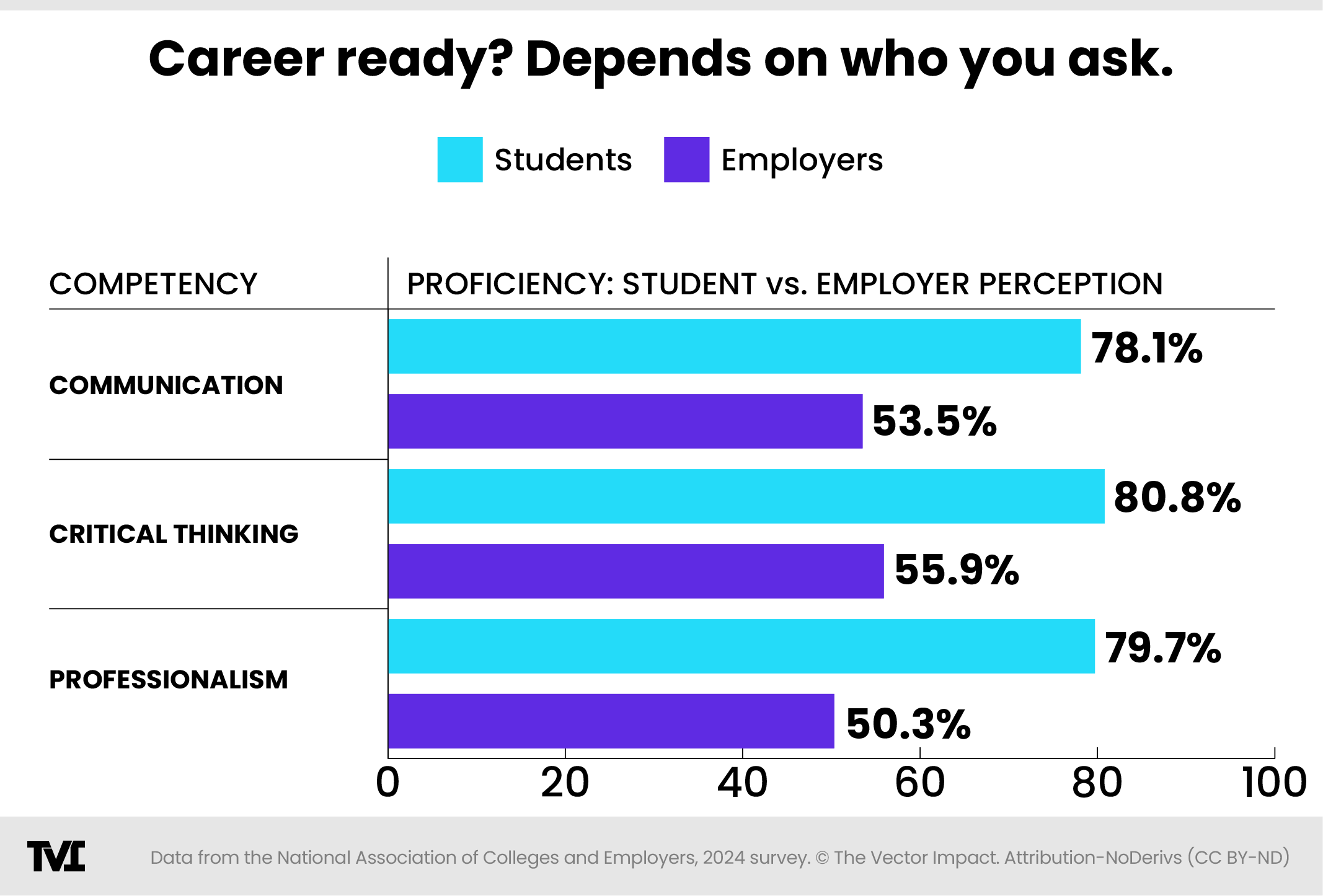
You pick a major, show up to class, crank out papers, survive group projects, and—if you’re lucky—emerge four years later with a diploma and a solid sense of direction.
But there’s one problem that’s not talked about enough:
Most students graduate college without the skills employers care about most.
I know this both anecdotally from talking with students and from what we consistently hear in the professional world (more on that below).
And I’ve experienced it myself.
I was an honors student, fresh out of college with all of the right internships and extracurriculars. Post-graduation, I worked multiple part-time jobs while I job-searched, applied, and interviewed. Repeatedly.
On paper, I was a great candidate, but I lacked crucial skills like confidence, how to talk about my accomplishments, and how to sell myself in an interview.
I had the qualifications. But I lacked career readiness.
My story is a familiar one. According to a recent survey by Intelligent.com, 60% of business leaders have had to fire new grads for lacking soft skills like communication, professionalism, and motivation.
Likewise, the National Association of Colleges and Employers (NACE) found a persistent mismatch between the skills employers want and the ones graduates actually have.
Unfortunately, classroom knowledge doesn’t translate into core skills—things like how to confidently talk to people, adapt on the fly, or handle rejection without spiraling.
Those are learn-by-doing skills. Real-world skills.
That’s where Vector comes in.
Whether you’re majoring in biology, business, or elementary education, sales experience fills in critical skills gaps.
With sales, you learn how to communicate with different people, manage your time, solve problems under pressure, and build the kind of confidence that follows you into every job you’ll ever have.
(And that’s not our sales pitch—it’s what we hear from Vector alumni again and again.)
What college *does* teach you (and why it’s not enough)
To be clear, your major isn’t useless. Far from it. College teaches you a ton—everything from understanding historical context to writing and research skills to field-specific expertise.
In the classroom, you gain foundational knowledge, analytical frameworks, and academic skills that help you understand the world—and your place in it—through a more informed lens.
Plus, you’ll inevitably learn to take responsibility and build independence along the way.
That’s valuable.
But here’s the deal: none of that automatically adds up to career readiness.
When employers talk about what they’re actually looking for in entry-level candidates, the conversation quickly shifts from GPAs and course loads to soft skills.
According to NACE’s 2024 survey, there’s a big gap between what students think they’re good at and what employers actually observe:
And that disconnect matters, because those skills are important components of career readiness.
College lays the academic foundation. But if you’re trying to build a career on that alone, you’re missing some vital structural support.
The good news? You can learn the missing pieces. (And yes, I’ll get into exactly how sales helps you do that next).
What Vector teaches you that college doesn’t
If you’re lacking career readiness, it’s not your fault.
The truth is that so many of these critical core skills are best learned on the job. Which makes job hunting extra challenging when the very skills you need to develop through hands-on practice are required on day one.
But Vector can help. In fact, we’ve been investing in the training and development of young people since 1981.
Regardless of what your major is—or what career you’re aiming for—this job builds skills that employers actually want.
1. Communication & Confidence
If I had a dollar for every employer who said they can’t find grads with strong communication skills… well, I could probably buy everyone a Cutco Ultimate Set.
Communication is more than giving a class presentation. It’s about expressing yourself clearly, listening with intention, and handling conversations that don’t always go according to plan.
At Vector, you learn how to connect with people—strangers, peers, customers, teammates. And you do it a lot. Which means you get better fast.
Anree (Communications) shared with us that his public speaking has improved significantly after working with “hundreds of people and thousands of strangers.” He breaks down the growth you can expect at Vector below.
Ellie (Exercise Physiology) talks about why these skills are essential in healthcare—and how she learned to adapt her communication style to different people and situations.
2. Critical Thinking & Resilience
Here’s a skill no one teaches you in lecture hall: how to keep your cool when things don’t go your way. Whether it’s a no from a customer, a tough conversation with a peer, or just a day that doesn’t go as planned, sales teaches you how to problem-solve in real time—and bounce back with confidence.
Abigayle (Nursing) explains how embracing discomfort and rejection helped her grow into a stronger, more capable version of herself.
Espen Bagheri (Marketing and Advertising) shared that Vector helped her approach challenges with a more analytical mindset: “Whether I’m facing a tough assignment or a real-life situation, I’ve learned to break problems down, consider different perspectives, and find effective solutions. It’s made me more confident handling unexpected obstacles and more resourceful in both academic and everyday situations.”
Daniel (Business Administration) reflects on being underestimated—and how pushing through challenges builds clarity, confidence, and career direction.
3. Time Management & Prioritization
Life gets busy. Between classes, work, sports, and your social life, managing your time isn’t optional—it’s survival.
At Vector, you’re in charge of your own schedule. You have the kind of flexibility and autonomy that’s rare for a college student (and extremely helpful when balancing school and work). And that means learning how to prioritize, plan ahead, and juggle responsibilities like a pro.
Kaylynn Kullnat (Accounting Information Systems) explains how working at Vector has taken her time management skills to the next level.
4. Leadership & Ownership
In most college classes, you learn about leadership. At Vector, you actually lead. Whether that’s managing your time, coaching teammates, or stepping into an assistant manager role, reps gain firsthand experience in taking initiative and owning their results.
Amara (Nutrition) shares how she built leadership and business skills that will carry into her future.
Ellie also reflects on how her assistant manager role taught her how to delegate tasks, manage a team, and coach others—essential leadership skills for any career.
Career readiness doesn’t just happen
Whatever your college major, core skills aren’t developed by simply taking classes. You build them through experiences that push you, challenge you, and stretch you. That’s what makes you career-ready.
Vector gives you that experience. And the best part? You don’t have to wait until after college to start learning the skills that will shape your entire career.
Learn to sell, build transferable skills, and become career-ready with Vector.







